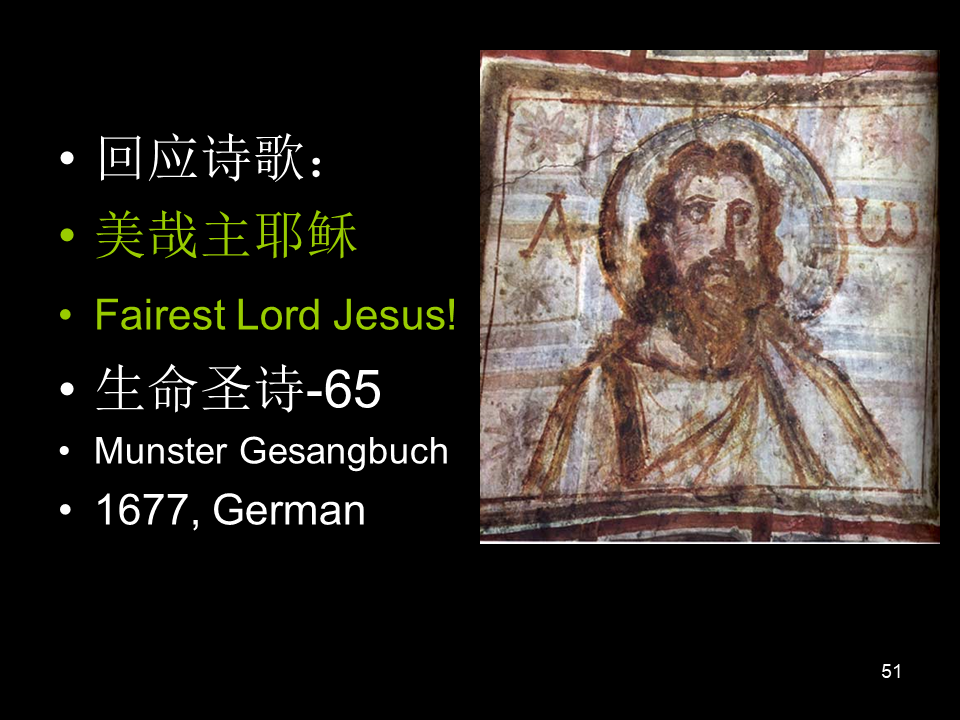神爱祂的儿子 God Loves His Son
约翰福音 John 5:16–30


- The Son insists that he has the right to go about his father’s business (16–18).
- The Son insists on saying he belongs to the heavenly father, this is a uniquely defined affiliation (19–23).
- The Son insists that he’s the same as the father, possessing life (24–26).
- The Son insists that he is the Son of Man, because he is the judge that’s approved by God (27–30).
- Applications

Review John 5:1–15
- Jesus is in control of everything.
This miracle revealed the power and divine qualities of Jesus Christ. - Free healing
Jesus mercifully chose to heal him, this is God’s grace;
This was an old, angry, resentful man; he was heartbroken and helpless.
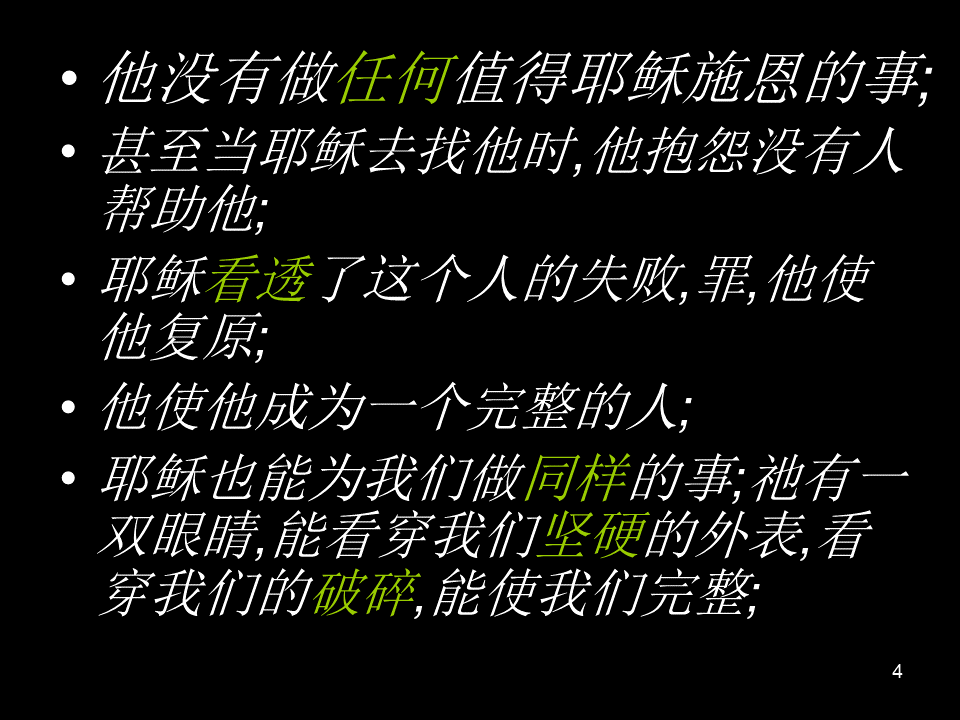
He didn’t do anything that merits Jesus’ mercy.
Even as Jesus looked for him, he was angry that no one was willing to help him.
Jesus saw through this man’s failure, sin, and made him well.
He made him into a restored (complete) person.
Jesus can also do the same for us; he has eyes that can see through our stubbornness and facade, see through our brokenness, and is able to restore us (make us complete).

3. Complete recovery (health)
It’s not just partially recovered; he was completely healed (5:9)
When Jesus made this paralytic stand up and walk, all illnesses and pain were gone
After this illness left his body, did this person require any physical therapy? How many days of exercise will he have to do to recover from his illness? None!
The Word of Jesus brought complete and thorough recovery.

In normal circumstances, Jesus will use illness to accomplish many other things, things that we know nothing about.
But we can pray, because illness is not match for Jesus.






John 5:16–30 ESV
And this was why the Jews were persecuting Jesus, because he was doing these things on the Sabbath. But Jesus answered them, “My Father is working until now, and I am working.” This was why the Jews were seeking all the more to kill him, because not only was he breaking the Sabbath, but he was even calling God his own Father, making himself equal with God. So Jesus said to them, “Truly, truly, I say to you, the Son can do nothing of his own accord, but only what he sees the Father doing. For whatever the Father does, that the Son does likewise. For the Father loves the Son and shows him all that he himself is doing. And greater works than these will he show him, so that you may marvel. For as the Father raises the dead and gives them life, so also the Son gives life to whom he will. For the Father judges no one, but has given all judgment to the Son, that all may honor the Son, just as they honor the Father.
Whoever does not honor the Son does not honor the Father who sent him. Truly, truly, I say to you, whoever hears my word and believes him who sent me has eternal life. He does not come into judgment, but has passed from death to life. “Truly, truly, I say to you, an hour is coming, and is now here, when the dead will hear the voice of the Son of God, and those who hear will live. For as the Father has life in himself, so he has granted the Son also to have life in himself. And he has given him authority to execute judgment, because he is the Son of Man. Do not marvel at this, for an hour is coming when all who are in the tombs will hear his voice and come out, those who have done good to the resurrection of life, and those who have done evil to the resurrection of judgment. “I can do nothing on my own. As I hear, I judge, and my judgment is just, because I seek not my own will but the will of him who sent me.

- Who is God’s son?
- When God worked on the Sabbath, did he violate Sabbath laws?
- What are some specific manifestations of God loving his son?

God’s son:
At the start of the gospel of John (John 1:6), it used the term “God’s son” for the angels.
Israel was also called “God’s son.”
Matt 5:9, the peacemakers are blessed, because they will be called the sons of God.
Matt 5:45 the ones who love their enemies will be called sons of God.

Paul called Christ the “adopted son.” What does this mean?
As early as Exo 4:22, YHWH told Moses, “…Israel is my firstborn son.”
Hosea 11:1 has “…and out of Egypt I called my son.” Matt 2:15 quoted this and applied it to Jesus.
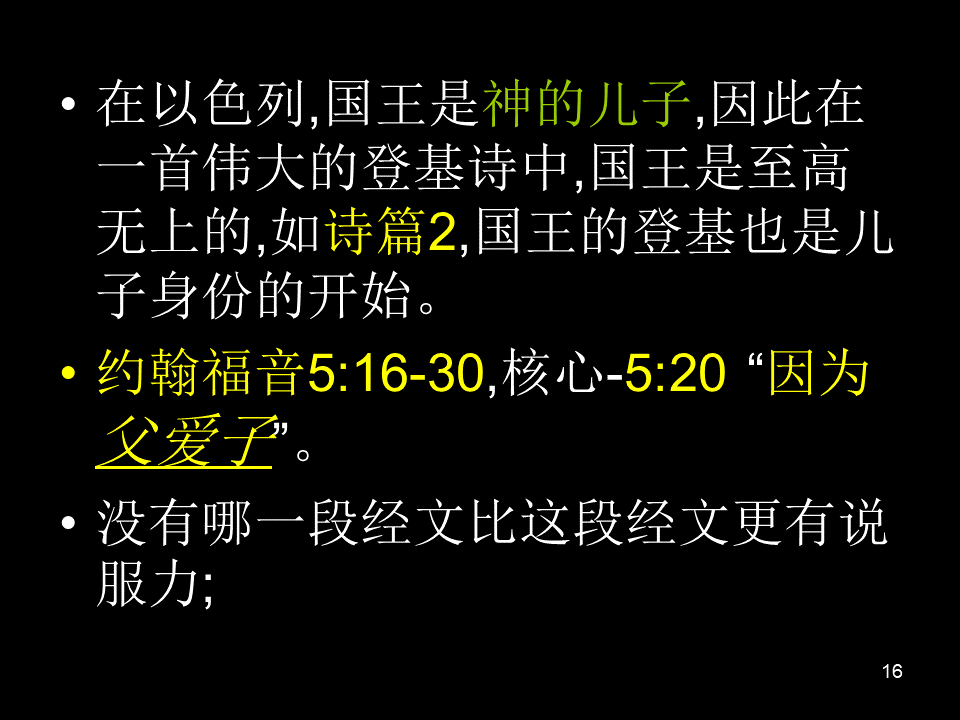
In ancient Israel, the king is God’s son, so in one of the great coronation poems (Psa 2) in the OT, it tells us the king is the highest in the land.
The coronation of a king is also the start of his status as son.
In John 5:16–30, the main (centre) part is John 5:20, “For the Father loves the Son…”
No other verse in the Bible is as convincing as this one.

This is the 2nd time this statement appeared.
First time was at the end of John 3 (John 3:35).
John 14 told us that the son loves the father.
This kind of mutual love was also mentioned in John 17.

The context: Jesus performed a miracle on the Sabbath. After the miracle, he let the former paralytic carry his own stretcher and go home.
This caused doubt and uncertainty among the religious authorities, they declared that this man violated the Sabbath (by carrying his own stretcher, which would be considered work).
The man said it’s not his fault, but the man who cured him told him to pick up his stretcher.
Ultimately, this led to conflicts between the religious authorities and Jesus.

From this confrontation, we learned 4 things about Christian’s confession that Jesus is God’s son.
These 4 things have a main point: The heavenly father loves his son.

John 5:16–18.
- The son insisted that he has the power to do what the father does (John 5:16–18)
The Son, just like the Father, did work on the Sabbath.
Jesus healed the illness, and at the same time, asked the former paralytic to pick up his own stretcher and go home.

Jesus could have questioned the interpretation of the law (the religious leaders’ interpretation) and gotten away with it.
In the OT, the prohibition against doing work in the Sabbath refers to work that you would normally do to make a living.
What Jesus did was to change the ultimate point of the entire discussion: It’s no longer about the Sabbath, but about who he as as Christ (Christology).

The discussion shows the long-standing dispute in the Jewish community at that time: Does God keep the law?
If God stopped his work on every Sabbath, the universe will likely collapse!
Jewish law subdivided the Sabbath command (4th commandment) into 39 sub-types of work.
E.g., if you stayed home on the Sabbath, but moved some pots around, it’s OK; but carrying a bag on your shoulders means you’re working hard (or seriously), so this is forbidden.

First century Jewish view is that God continued to work on the Sabbath, but didn’t violate any Sabbath laws. Jesus point this out.
He didn’t argue the details, but simply said, “For whatever the Father does, that the Son does likewise.” (John 5:19)

John 5:18
In some sense, the Jews considered themselves to be sons of God, but no Jew would ever dare to say that he possesses all of the privilege and power of God.
Attributes of God that can (or cannot) be passed on to us:
- God said “be holy, for I am holy” (Lev 11:44); he never said “be omnipotent, because I am omnipotent.”
- Same argument for God being omnipresent
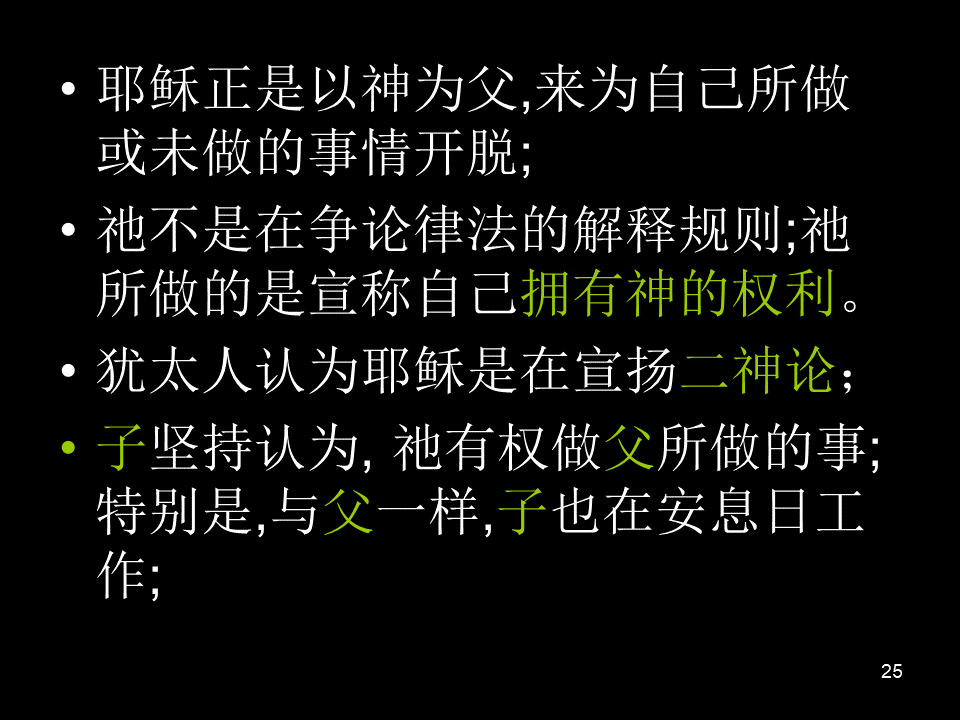
Jesus justified what he did (or didn’t do) by claiming God as his father.
He wasn’t arguing or explaining the laws or their interpretation, but he was claiming that he has the rights of God (he can do what God does).
The Jews thought Jesus was preaching that there are two gods (dualism).
The Son insisted that he has the right to do what the father does, and in particular, like the Father, the Son also worked on the Sabbath.
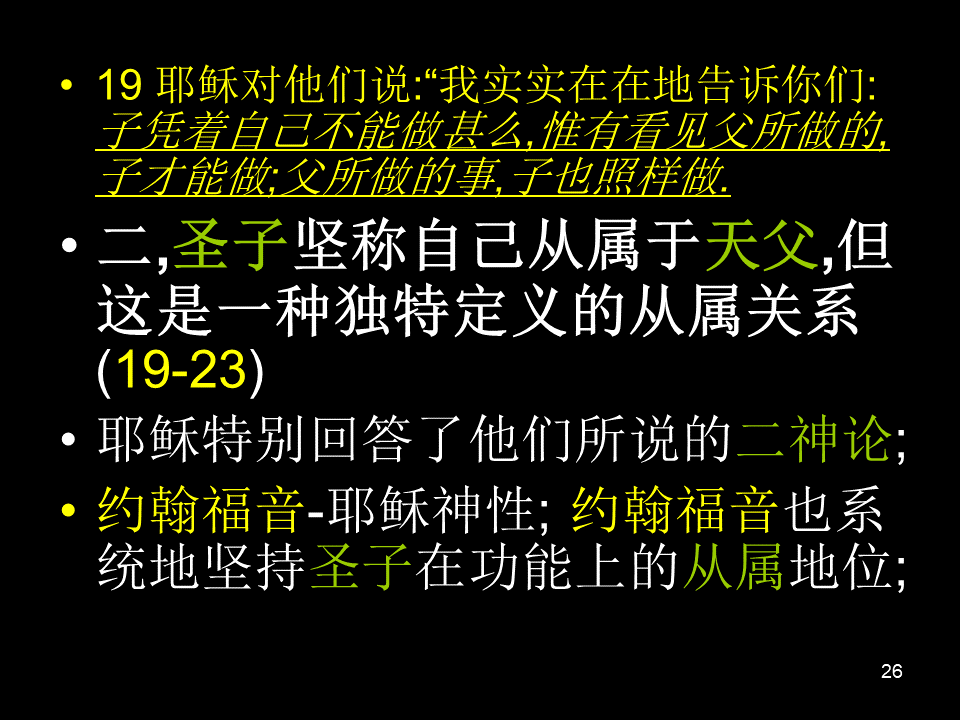
John 5:19
2. The Son insists that he’s subordinate to the Father, but this subordination is unique (see John n5:19–23)
In John’s gospel, he also consistently insisted on the functional subordination of the Son (the Son is subordinate to the Father).

John 5:30
John 8:29
John 14:31
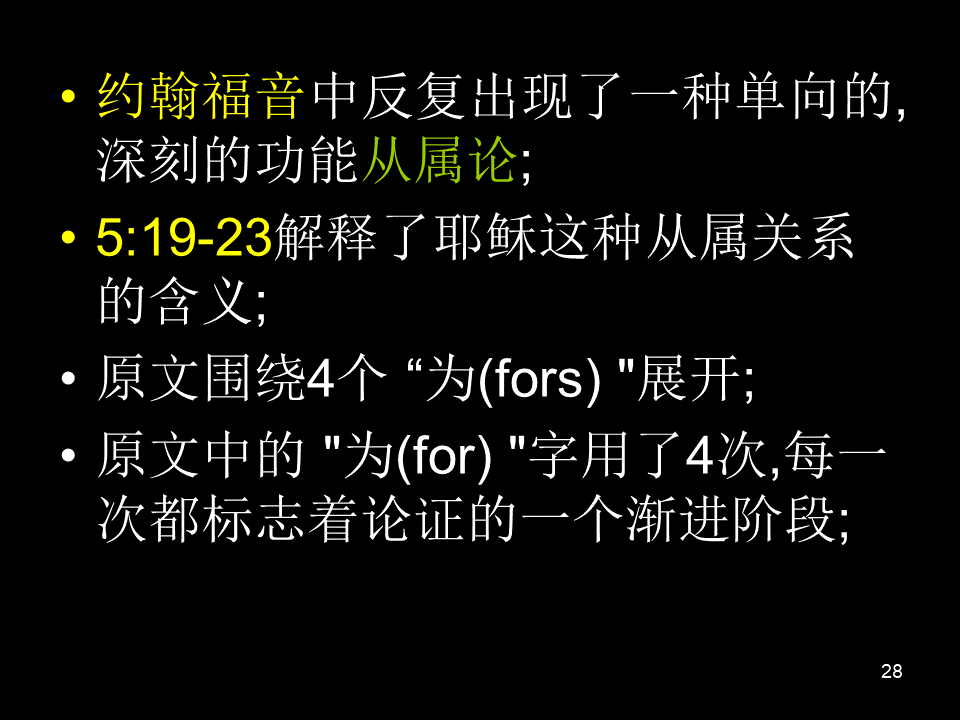
John’s gospel showed that this subordination (of Son to Father) is one-way only.
John 5:19–23 explains the meaning of Jesus’ subordination.
In the original Greek, there are 4 “for” (or “because”) statements.
Each “for” advances the argument further.
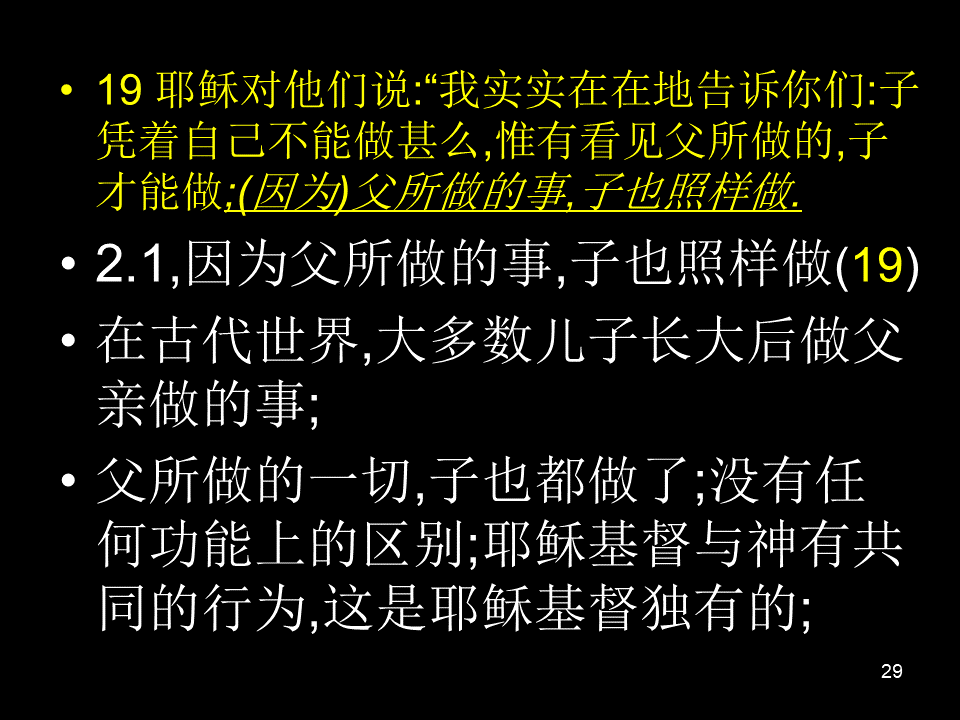
John 5:19
- Because what the Father did, the Son will also do (John 5:19).
In the ancient world, the son follows the father’s vocation.
Whatever the father does, the son will also do. There’s no difference in terms of functionality.
Jesus behaves in the same way as God, and only Jesus is able to do this.
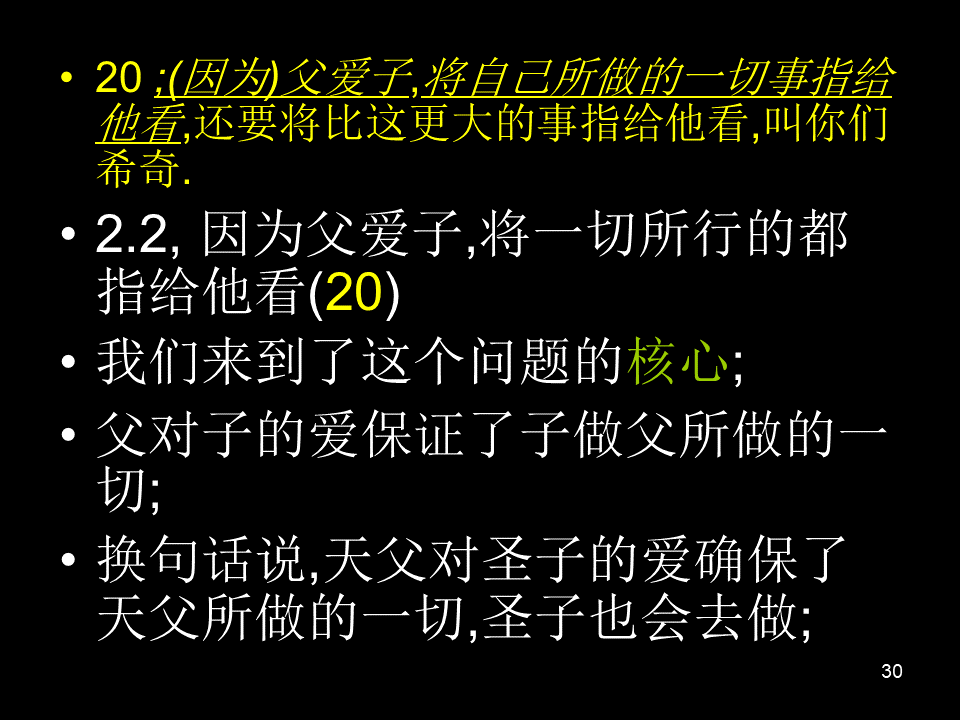
John 5:20
2. Because the father loved the son, and showed him everything (John 5:20).
We now come to the heart of this question:
The love of the Father guarantees that Son will do all that the Father does.
In other words: the Father’s love for the Son ensures that whatever the Father does, the Son will also do.

It’s the loving relationship within the Trinity that guarantees the perfection of the revelation of the Son.
This brings up an important question: How can we see God revealing himself in a finite man?
At least in some areas, there are limits (finite).
E.g., when Jesus was in Jericho, he wasn’t in Jerusalem.
When he was in Jerusalem, he wasn’t in Galilee.
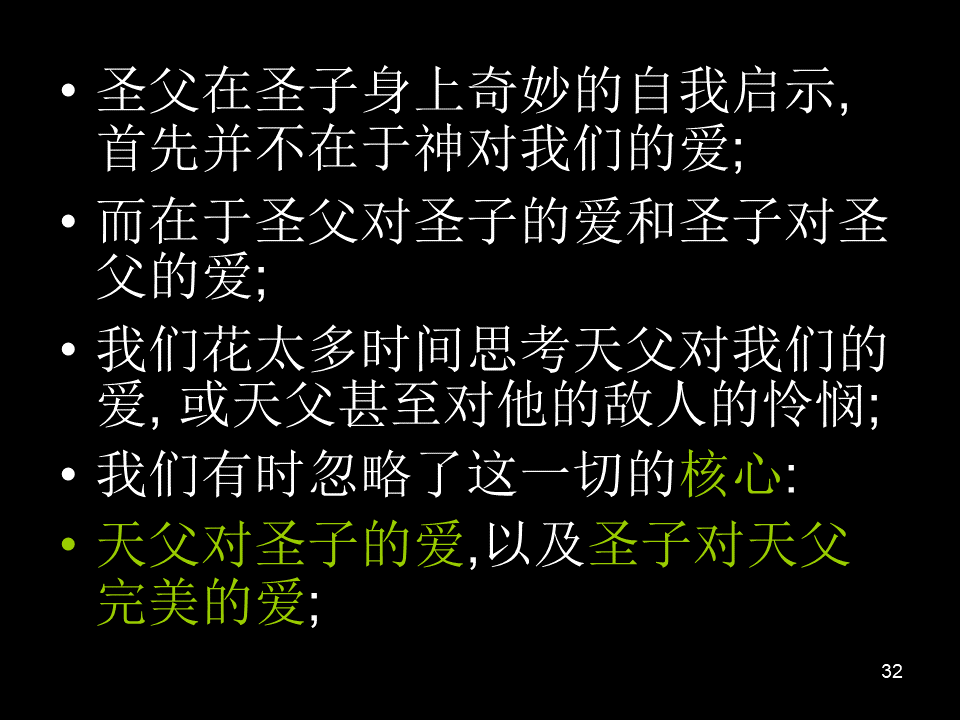
The wonderful self-revelation of the Father in the Son is not mainly about God’s love for us, but about the love of the Father for the Son, and vice versa.
We spend far too much time thinking about the Father’s love for us, or even about how the Father shows mercy towards his enemies.
We sometimes missed the main point of all this: The love of the Father for the Son, and the Son’s perfect love for the Father.

What led Jesus to the cross?
Have we heard his prayer in the Gethsemane? “…not as I will, but as you will.” (Matt 26:39)
We must understand because Jesus perfectly loved the Father, so he always followed the Father’s commands.
The Father commissioned Jesus to go to the cross, how can the Son refuse?

John 5:20b
3. Just like the Father resurrected the dead, giving them life, the Son likewise gives life to whomever he pleases.
To give life is God’s prerogative, only God can give life.
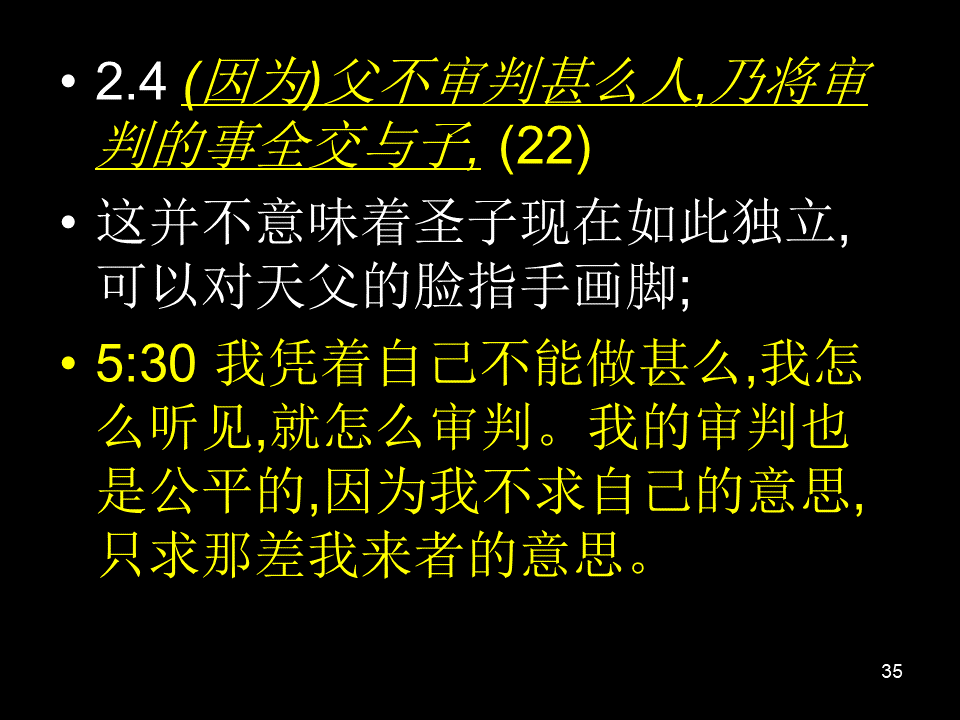
John 5:22
4. “For the Father judges no one, but has given all judgment to the Son.”
This doesn’t imply that the Son is now independent, and can do whatever he wants to his Father’s face.
John 5:30.
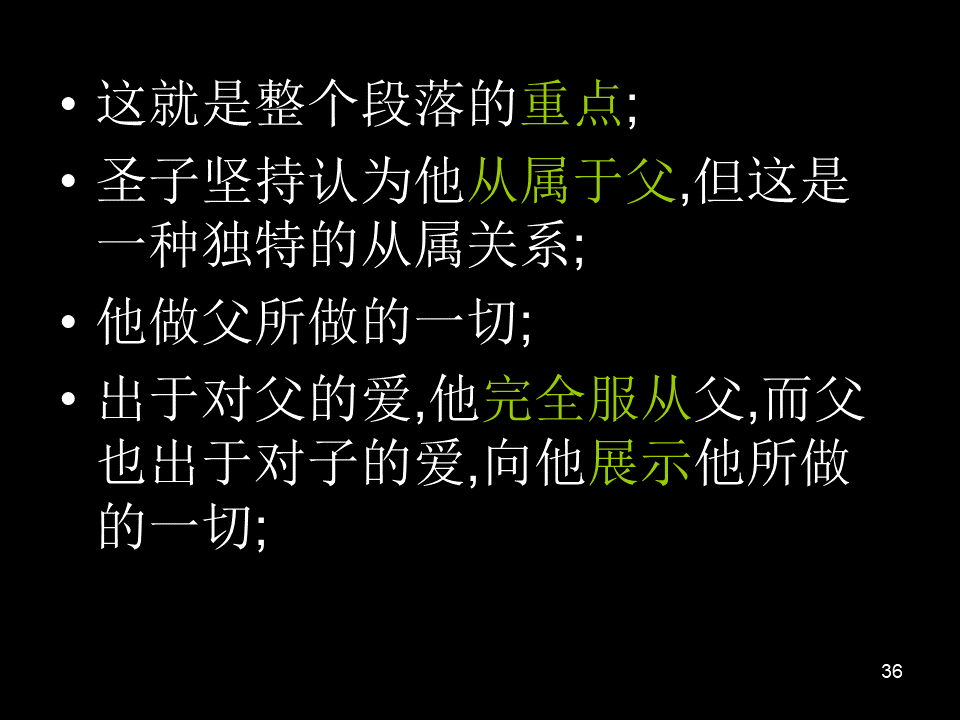
This is the main point of the entire passage.
The Son insists that he’s subordinate to the Father, but this is a special kind of subordination.
The Son does everything the Father does.
He obeys the Father completely, and likewise, the Father shows the Son everything that he does, out of his love for the Son.

The entire plan of salvation, the great purpose of the incarnation, and all the paths leading to the cross, these are all part of the Father’s mission, and the Son lovingly follows this mission of the Father.
What is the Father’s purpose in all this?
John 5:23

John 5:24
3. The Son insists that he has life just like the Father (John 5:24–26).
All of Jesus’ Words are God’s Word, they are the result of the perfect love between the 3 persons in the Trinity.

The Son has the power to give life, just like God.

John 5:27
4. The Son insists that he’s also the Son of Man, because God recognised him as judge (John 5:27–30).
In the gospel of John (and many other places in Scripture) the term “Son of Man” appeared dozens of times, always anarthrous (without the definite article “the”), it’s a title.
We think of Daniel 7, the great “Son of Man” image.

This is the title that Jesus used on himself.
This is the only place in the gospels where the title is anarthrous.
The translation of John 5:27 is accurate, “And he has given him authority to execute judgment, because he is the Son of Man.”
Even though God’s justice is perfect, he has given this right to execute judgement to the Son, precisely because the Son is a man (human).
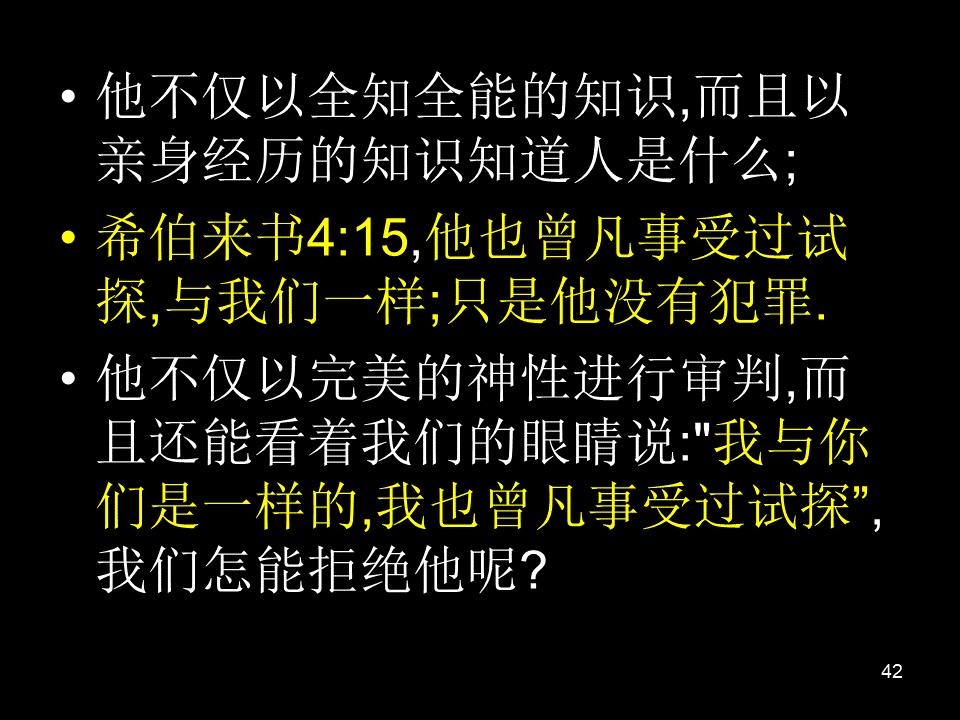
He’s not only omniscience, but he also lived as a human, he has experienced humanity as a human.
In Heb 4:15, it tells us he has been tempted in all ways, just like us, except that he is without sin.
He not only judges as God does (perfect divinity), but he can also look us in the eye and say: “I’m just like you, I’ve also been tempted in all ways.”
How can we reject him (as Lord and Saviour)?

John 5:28
The final judgement.
The Son has perfect authority, the authority of God, and he also has the qualification of being human.
The Son insists that he’s not only God’s son, but also the Son of Man, thus he is the judge approved by God.
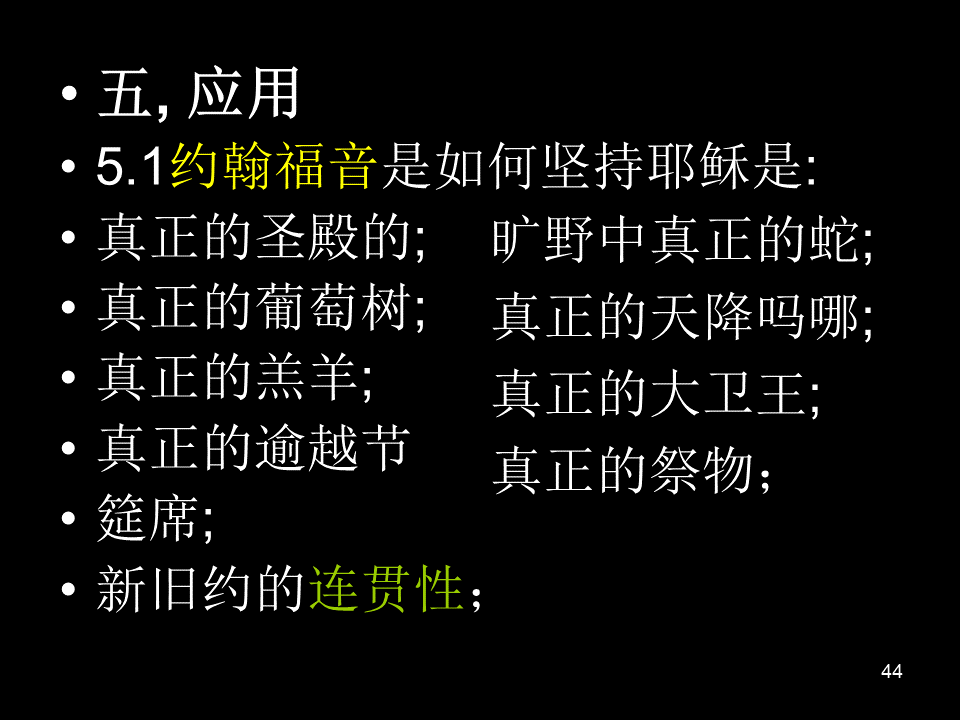
5. Applications
John’s gospel insists that Jesus is:
- The true temple
- The true vine
- The true lamb
- The true Passover
- The continuity between the OT and NT
- The true serpent in the wilderness (Num 21:4–8)
- The true manna from heaven
- The true king in the line of King David
- The true sacrifice
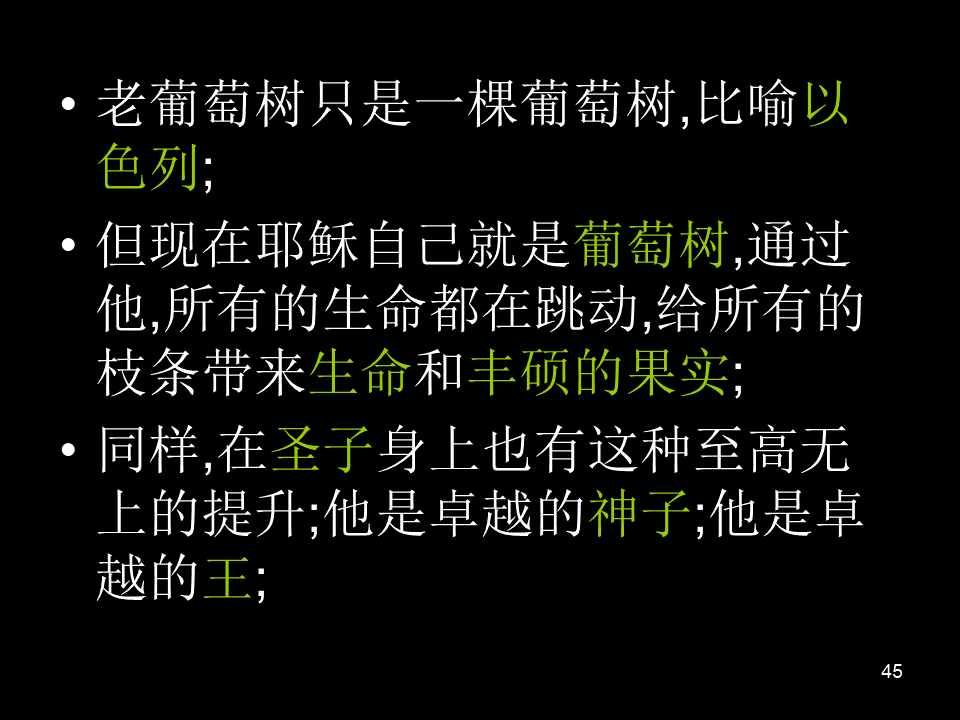
The old vine is just a grape vine, a metaphor for Israel.
But now Jesus himself is the vine. Through him, there is life, bringing life and fruitfulness to all the branches.
Similarly, in the Son there is this supreme exaltation: he is the Son par excellence, as well as the ultimate King.

Knowing how all these themes work together will help us to see the Bible as one book (or one story), and preach the OT in its entirety and preach it thoroughly.
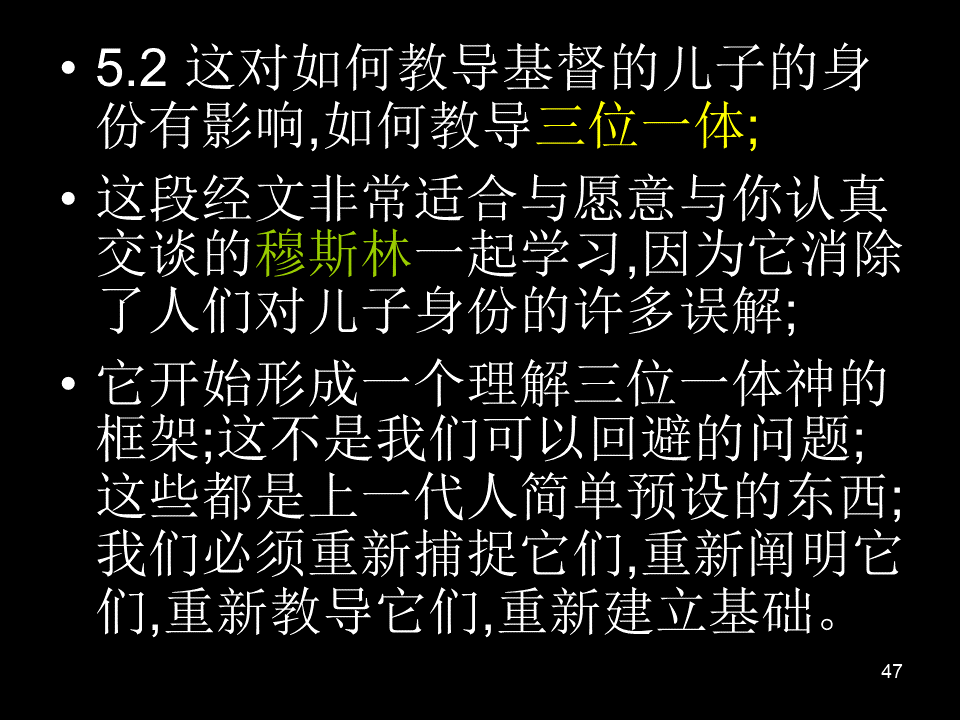
- This also affects how we teach about the sonship of Christ, how we teach about the Trinity.
- This passage is suitable to share with Muslims who want to have a serious conversation with you. It dispels many misunderstandings about the sonship.
- It forms a framework for understanding the Trinity. These are not topics we can avoid, they are all things that the previous generations have assumed; we need to recapture these things, re-articulate them, re-teach them, and re-do the foundation.
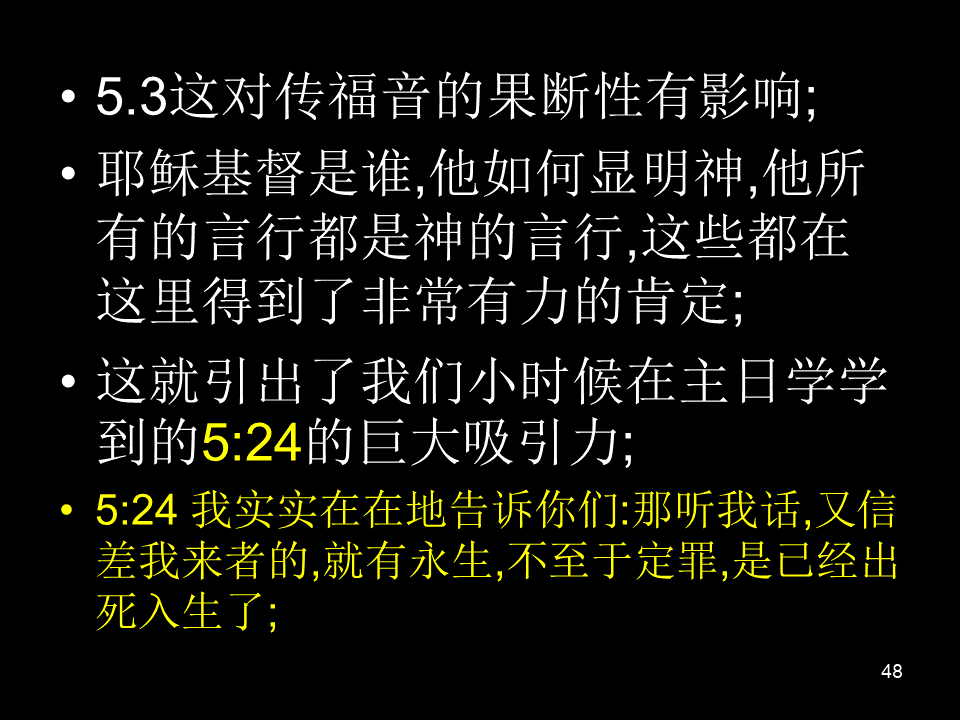
This has implications on how we share the gospel:
- Who is Jesus Christ, how he reveals God, all his Words and deeds are God’s Words and deeds. All these things are strongly affirmed in today’s passage.
- This also brings out the great appeal of something we learned in Sunday School as children:
- “Truly, truly, I say to you, whoever hears my word and believes him who sent me has eternal life. He does not come into judgment, but has passed from death to life.” John 5:24

If we don’t understand the nature of problem that Christ came to solve, we’ll go and have him resolve some similar problems, and so unknowingly turn the gospel into something else.
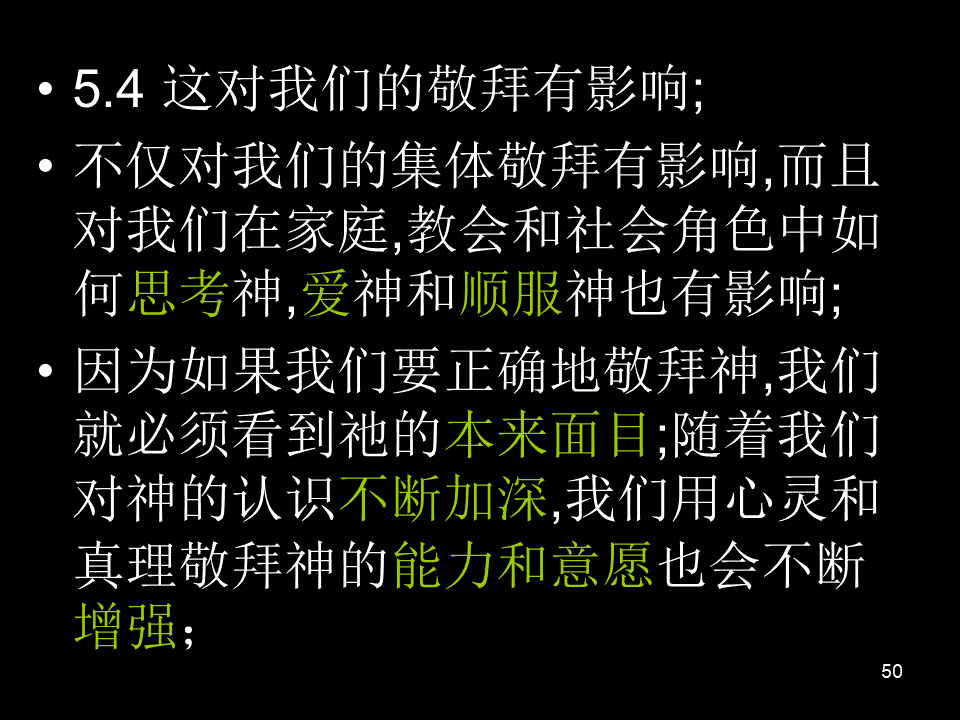
This will also impact on our worship.
- Not just on our collective worship, but also in how we think about God, love and obey God in our family, church, and social roles.
- If we are to worship God properly, we must see him as he is. As we know God more and more, our willingness to worship God in spirit and truth will continue to grow.
